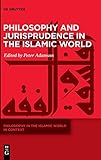Philosophy in the Islamic World in Context. Volume 1, Philosophy and Jurisprudence in the Islamic World / ed. by Peter Adamson.
Material type: TextSeries: Philosophy in the Islamic World in Context ; Volume 1Publisher: Berlin ; Boston : De Gruyter, [2019]Copyright date: ©2019Description: 1 online resource (XII, 316 p.)Content type:
TextSeries: Philosophy in the Islamic World in Context ; Volume 1Publisher: Berlin ; Boston : De Gruyter, [2019]Copyright date: ©2019Description: 1 online resource (XII, 316 p.)Content type: - 9783110551976
- 9783110552188
- 9783110552386
- 181.07 23
- BP163 .P45 2019
- online - DeGruyter
| Item type | Current library | Call number | URL | Status | Notes | Barcode | |
|---|---|---|---|---|---|---|---|
 eBook
eBook
|
Biblioteca "Angelicum" Pont. Univ. S.Tommaso d'Aquino Nuvola online | online - DeGruyter (Browse shelf(Opens below)) | Online access | Not for loan (Accesso limitato) | Accesso per gli utenti autorizzati / Access for authorized users | (dgr)9783110552386 |
Frontmatter -- Table of Contents -- Preface -- Philosophical Reflections in the Poetry of al-Shāfiʿī -- Ethics and Fiqh in al-Fārābī’s Philosophy -- Ibn Sīnā’s Moral Ontology and Theory of Law -- In the Footsteps of Ibn Sīnā? The Uṣūlī Debate on the Argumentum e Contrario -- Al-Ghazālī on Philosophy and Jurisprudence -- Syllogistic Logic in Islamic Legal Theory: al-Ghazālī’s Arguments for the Certainty of Legal Analogy (Qiyās) -- Deontic Modalities in Ibn Ḥazm -- Splitting the Process and the Result: Philosophy from a Legal Perspective in Averroes’ Decisive Treatise -- Foundations of Ibn Taymiyya’s Religious Utilitarianism -- Value Ontology and the Assumption of Non-Assessment in Postclassical Shīʿī Legal Theory -- Tajarrī as Religious Luck -- Concomitance to Causation: Arguing Dawarān in the Proto-Ādāb al-Baḥth -- Bibliography -- Index of Names -- Index of Subjects
restricted access online access with authorization star
http://purl.org/coar/access_right/c_16ec
This book brings together the study of two great disciplines of the Islamic world: law and philosophy. In both sunni and shiite Islam, it became the norm for scholars to acquire a high level of expertise in the legal tradition. Thus some of the greatest names in the history of Aristotelianism were trained jurists, like Averroes, or commented on the status and nature of law, like al-Fārābī. While such authors sought to put law in its place relative to the philosophical disciplines, others criticized philosophy from a legal viewpoint, like al-Ghazālī and Ibn Taymiyya. But this collection of papers does not only explore the relative standing of law and philosophy. It also looks at how philosophers, theologians, and jurists answered philosophical questions that arise from jurisprudence itself. What is the logical structure of a well-formed legal argument? What standard of certainty needs to be attained in passing down judgments, and how is that standard reached? What are the sources of valid legal judgment and what makes these sources authoritative? May a believer be excused on grounds of ignorance? Together the contributions provide an unprecedented demonstration of the close connections between philosophy and law in Islamic society, while also highlighting the philosophical interest of texts normally studied only by legal historians.
Mode of access: Internet via World Wide Web.
In English.
Description based on online resource; title from PDF title page (publisher's Web site, viewed 21. Jun 2021)


